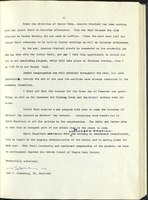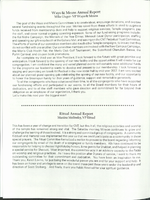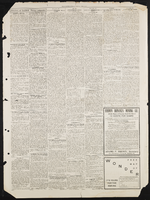Search the Special Collections and Archives Portal
Search Results

Minutes from Temple Beth Sholom Board of Directors meetings, July 1993 - December 1993
Date
1993
Archival Collection
Description
Meeting minutes include reports from committees of the board, correspondence, and balance sheets.
Text

Minutes from Temple Beth Sholom Board of Directors meetings, May 1974 - May 1975
Date
1974 to 1975
Archival Collection
Description
The meeting minutes of the board of directors of Temple Beth Sholom include the proceedings of meetings held from 1973 to 1974.
Text

Annual report from Congregation Ner Tamid, 2006
Date
2006
Archival Collection
Description
Annual report from Congregation Ner Tamid, 2006
Text

Meeting minutes for Consolidated Student Senate, University of Nevada, Las Vegas, March 20, 1979
Date
1979-03-20
Archival Collection
Description
Includes meeting agenda and minutes with additional information about the activities board meeting and the organization meeting.
Text

Lecture by Herbert Frank York, October 12, 2005
Date
2005-10-12
Archival Collection
Description
Narrator affiliation: Physicist, First director, Lawrence Livermore Laboratory; Arms control negotiator; Director, Defense Dept. Research and Engineering
Text

Interview with Dorothy Jean (Whitcomb) Grier, January 3, 2005
Date
2005-01-03
Archival Collection
Description
Narrator affiliation: Secretary, Los Alamos Scientific Laboratory
Access note: No audio available
Access note: No audio available
Text

Interview with Philip Wymer Allen, July 9, 2004
Date
2004-07-09
Archival Collection
Description
Narrator affiliation: Meteorologist-in-Charge, Weather Bureau Research Station, Nevada Test Site
Text

Interview with Joseph C. Behne, Jr., July 22, 2004
Date
2004-07-22
Archival Collection
Description
Narrator affiliation: Test Director, Lawrence Livermore National Laboratory
Text

Interview with Harold David Cunningham, March 11, 2004
Date
2004-03-11
Archival Collection
Description
Narrator affiliation: General Manager, Reynolds Electrical and Engineering Company (REECo)
Text
Pagination
Refine my results
Content Type
Creator or Contributor
Subject
Archival Collection
Digital Project
Resource Type
Year
Material Type
Place
Language
Records Classification

